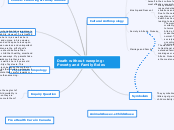Death without weeping: Poverty and Family Roles
Cultural Anthropology
Ethology
Sheper - Hughes, in the 1980s, returned to Brazil to try and help with women and children of the Brazilian Slums as a peace corps volunteer. She also lived along aside some of the poorest and marginalized women in the world. This allowed her, to immerse herself in their culture for months and bring back the most effective research.
Kinship and Descent
Many women learn valuable life lessons from their respected elders. They learn to normalize difficult situations and accept their children's fate if it arrives. Due to the normality created by their elders, the high expectancy of death and the ability to face child death has caused many children to be neglected, leading to death.
Society in Alto do Cruzeiro
The women of Alto do Cruzeiro categorize child mortality into three categories that allow them to come to terms with the death of their children. The society in Alto do Cruzeiro view babies as an aversion to life that make their death seem natural, anticipated and normal. The women are taught by experience and society around them that child mortality is uncontrollable and normal, so they should not invest their nurturing resources on their children.
Marriage and Family
The women of Alto do Cruzeiro have very little access to traditional supports such as stable marriages and extended family households. Without stable marriages or extended family support, the mothers in Alto do Cruzeiro's only choice is to leave their infants at home alone while they work.
Symbolism
They symbolize church bells to represent "another little angel going to heaven". This overall shows that child mortality is very normal and expected for them.
Animal Abuse v.s Child Abuse
Animal abuse and child abuse go hand in hand when talking about the Alto children and their mothers. The alto mothers "abuse" their children in a way, as they don't care of their children and have no emotional connection between them, even if they happen to pass away at an early age. Animal abuse is related to this, because some animals are not taken care of properly (animal testing, etc.) and this can effect the animals health care as well as the atmosphere that is created while doing so. Animal abuse and child abuse are two major important topics that need to be taken more seriously as they affect more than what he think of as reality, which is very concerning.
Free Health Care in Canada
The Alto mothers and children are not entitled to free health care, yet some families need it more than others. I can proudly say that I am so grateful and thankful that I live in a country like Canada, as there are so many facilities as well as Health Care Services for any citizen in Canada which is incredible, as it also free of charge. I would say we should send some troops to help the Alto families, as their children are dying slowly, and the mothers can't do much about it, because of the lack of facilities and cost that families have in underdeveloped countries.
Course: Parenting & Family Studies
This case study relates to the course Parenting & Family Studies, because the case study is very driven towards the idea of life and society in the Alto living space. The course, Parenting & Family Studies, explores similar topics such as, parenting, family, children, healthy lifestyle and child care, all these topics can be deeply researched in the Alto atmosphere.
The Alto women are much focused on the traditional supports available in the rural farm village such as stable marriages, extended family households, rather than their very own children. In our society, we see a difference in attitude and traditions, as we are very protective and affectionate over our children, whereas the Alto household are vice versa. They also live in difficult conditions and work on sugar plantations as unprotected laborers, clearing or weeding as domestic servants in the homes of the rich, or washing clothes on the river banks, which means they have less time to support and take care of their children.
Personal Family (Siblings)
I have a younger brother, who is treated very uniquely as he has a learning disability. However, he is treated fairly no matter what state he is in, as well as he is very intellectually smart and unique in his own way. The mother of Alto children don't aspire to look upon their children, as they mean useless and unimportant matter, but in reality children are the gift of god's grace. Each and everyone should be more than blessed that they have a child that healthy, smart and beautiful in both his or her own ways. My parents take lots of responsibility towards my brother, as he special in his own way, as well as he is 4 years old and has a learning disability of dyslexia. This connection is very prevalent, because the mother of Alto are less careful towards their children, where as I can see my parents are more than careful towards my little brother which is more than amazing.
Physical Anthropology
Ethnography
The women of Alto do Cruzeiro have very few choices in their lives. They do not have access to traditional supports available in the rural farm village such as stable marriages, extended family households and subsistence gardens. They also live in difficult conditions and work on sugar plantations as unprotected laborers, clearing or weeding as domestic servants in the homes of the rich, or washing clothes on the river banks. Where as the women in most developed countries do not work as laborers and live in regulated and safer environments.
Inquiry Question
How does the lack of resources lead to the neglect of Alto children? Since in their society child mortality is high, do the children feel hopeless when they are neglected? Do they feel as if fate will come to them?
